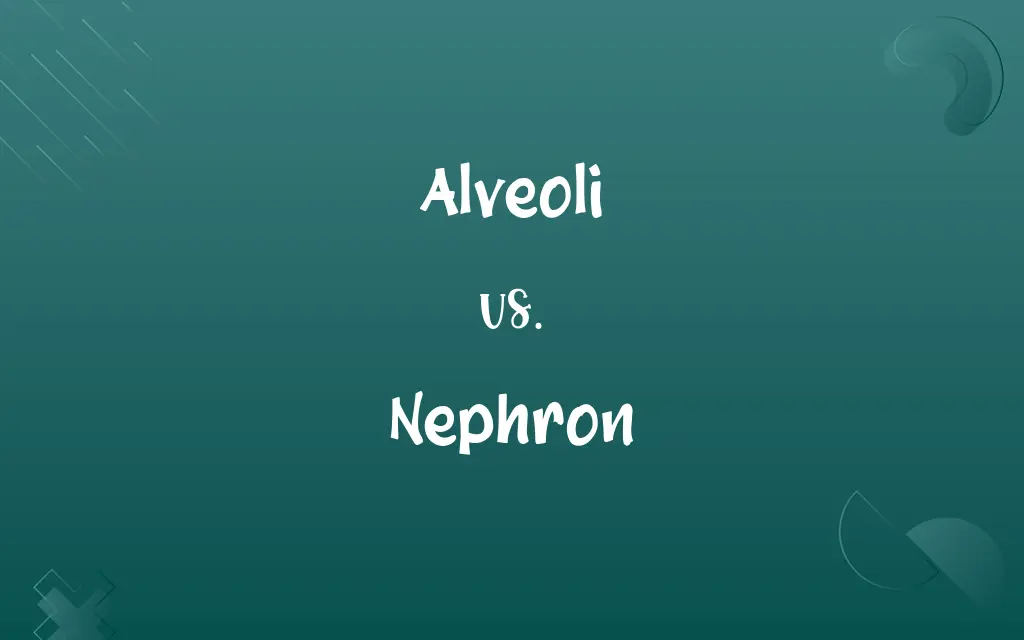Alveoli vs. Nephron: Know the Difference

By Shumaila Saeed || Published on February 24, 2024
Alveoli are tiny air sacs in the lungs for gas exchange, while nephrons are functional units in kidneys for filtering blood and urine formation.

Key Differences
Alveoli are essential components of the respiratory system, found in the lungs, where they facilitate the exchange of oxygen and carbon dioxide. In contrast, nephrons are the basic structural and functional units of the kidney, playing a crucial role in filtering blood and forming urine. Both are vital for maintaining homeostasis but function in different organ systems.
Shumaila Saeed
Feb 24, 2024
Each alveolus, a microscopic air sac, is where blood gains oxygen and loses carbon dioxide. Nephrons, on the other hand, filter waste products from the blood to produce urine. While alveoli are involved in respiratory gas exchange, nephrons are integral to the excretory system, highlighting their distinct roles in the body.
Shumaila Saeed
Feb 24, 2024
The structure of alveoli is designed to maximize surface area for efficient gas exchange, with a network of capillaries surrounding each alveolus. Nephrons, however, consist of a renal corpuscle and a renal tubule, specialized for filtering and absorbing substances from the blood. Both structures demonstrate a high level of specialization for their respective functions.
Shumaila Saeed
Feb 24, 2024
Alveoli function continuously as we breathe, exchanging gases with each breath. In contrast, nephrons constantly filter blood, controlling the balance of water, salts, and minerals, and removing wastes. Although both operate continuously, their mechanisms and substances they deal with are markedly different.
Shumaila Saeed
Feb 24, 2024
In diseases, the functionality of alveoli and nephrons can be compromised differently. Alveoli are affected in conditions like pneumonia or emphysema, impacting breathing. Nephron damage, seen in kidney diseases like nephritis, affects the body's ability to filter blood and manage waste. Both are critical for life but vulnerable to different types of diseases.
Shumaila Saeed
Feb 24, 2024
ADVERTISEMENT
Comparison Chart
Structure
Small air sacs with capillaries
Composed of a renal corpuscle and tubule
Shumaila Saeed
Feb 24, 2024
Role in Body Systems
Part of the respiratory system
Integral to the urinary system
Shumaila Saeed
Feb 24, 2024
Disease Impact
Affected by respiratory diseases
Impaired by kidney disorders
Shumaila Saeed
Feb 24, 2024
ADVERTISEMENT
Alveoli and Nephron Definitions
Alveoli
Alveoli are tiny air sacs in the lungs where gas exchange occurs.
During a deep breath, oxygen is absorbed into the bloodstream through the alveoli.
Shumaila Saeed
Jan 18, 2024
Nephron
Nephrons are the basic functional units of the kidney that filter blood to form urine.
Each nephron in the kidney ensures toxins are efficiently removed from the bloodstream.
Shumaila Saeed
Jan 18, 2024
Alveoli
Alveoli are elastic structures that expand and contract during breathing.
The elasticity of alveoli helps in the efficient expulsion of air during exhalation.
Shumaila Saeed
Jan 18, 2024
Nephron
Nephrons regulate the concentration of water and soluble substances in the blood.
The nephron's ability to control water balance is essential for maintaining blood pressure.
Shumaila Saeed
Jan 18, 2024
Alveoli
Alveoli are lined with a thin layer of cells to allow rapid diffusion of gases.
In the alveoli, oxygen diffuses quickly into the blood due to their thin lining.
Shumaila Saeed
Jan 18, 2024
ADVERTISEMENT
Nephron
Nephrons consist of a filtering unit and a tubule for processing filtrate.
In each nephron, the renal corpuscle filters the blood, and the tubule processes the filtrate.
Shumaila Saeed
Jan 18, 2024
Alveoli
Alveoli are surrounded by a network of capillaries for blood-gas exchange.
Blood flowing through the capillaries around each alveolus picks up oxygen and releases carbon dioxide.
Shumaila Saeed
Jan 18, 2024
Nephron
Nephrons play a key role in regulating the body's electrolyte balance.
The precise operation of nephrons is crucial for maintaining the correct levels of sodium and potassium in the body.
Shumaila Saeed
Jan 18, 2024
Alveoli
Alveoli increase the lungs' surface area to facilitate efficient oxygen and carbon dioxide exchange.
The alveoli's extensive surface area is crucial for sustaining high levels of physical activity.
Shumaila Saeed
Jan 18, 2024
Nephron
Nephrons remove waste products and excess substances from the blood.
Nephrons actively filter out urea, a waste product, from the bloodstream.
Shumaila Saeed
Jan 18, 2024
Nephron
The functional excretory unit of the vertebrate kidney that regulates the amount of water in the body and filters wastes from the blood to produce urine.
Shumaila Saeed
Jan 18, 2024
Nephron
(anatomy) The basic structural and functional unit of the kidney, which filters the blood in order to regulate chemical concentrations, and thereby produces urine.
Shumaila Saeed
Jan 18, 2024
Alveoli
A tiny, thin-walled, capillary-rich sac in the lungs where the exchange of oxygen and carbon dioxide takes place. Also called air sac.
Shumaila Saeed
Jan 18, 2024
Nephron
Any of the small tubules that are the excretory units of the vertebrate kidney
Shumaila Saeed
Jan 18, 2024
Repeatedly Asked Queries
How do alveoli function?
They facilitate the exchange of oxygen and carbon dioxide between the lungs and blood.
Shumaila Saeed
Feb 24, 2024
What are alveoli?
Alveoli are tiny air sacs in the lungs where gas exchange occurs.
Shumaila Saeed
Feb 24, 2024
Can alveoli regenerate?
Alveoli have limited regenerative capacity, but severe damage can lead to permanent loss.
Shumaila Saeed
Feb 24, 2024
What diseases affect alveoli?
Conditions like pneumonia and emphysema can damage alveoli and impair breathing.
Shumaila Saeed
Feb 24, 2024
What is the structure of an alveolus?
Each alveolus is a small, elastic air sac lined with a thin layer of cells and surrounded by capillaries.
Shumaila Saeed
Feb 24, 2024
What are the main parts of a nephron?
A nephron consists of a renal corpuscle and a renal tubule.
Shumaila Saeed
Feb 24, 2024
Can nephrons regenerate?
Nephrons have limited regenerative ability; damage is often irreversible.
Shumaila Saeed
Feb 24, 2024
How do alveoli and nephrons differ in function?
Alveoli are involved in gas exchange, while nephrons filter blood and regulate bodily fluids.
Shumaila Saeed
Feb 24, 2024
What is a nephron?
A nephron is the basic functional unit of the kidney, responsible for filtering blood and forming urine.
Shumaila Saeed
Feb 24, 2024
What role do nephrons play in the urinary system?
Nephrons filter waste and regulate fluid and electrolyte balance, crucial for the urinary system.
Shumaila Saeed
Feb 24, 2024
What lifestyle factors can protect alveoli?
Avoiding smoking, reducing pollution exposure, and practicing deep breathing can protect alveoli.
Shumaila Saeed
Feb 24, 2024
How many nephrons are in a kidney?
Each human kidney contains about 1 million nephrons.
Shumaila Saeed
Feb 24, 2024
What conditions affect nephrons?
Diseases like nephritis and diabetes can damage nephrons, impairing kidney function.
Shumaila Saeed
Feb 24, 2024
How can one maintain healthy nephrons?
Staying hydrated, controlling blood pressure, and managing diabetes are key to nephron health.
Shumaila Saeed
Feb 24, 2024
How do nephron-related diseases affect the body?
Nephron damage can lead to toxin build-up, electrolyte imbalances, and kidney failure.
Shumaila Saeed
Feb 24, 2024
Can alveoli and nephrons be artificially replicated?
While there are advances in artificial organs, fully replicating the complex functions of alveoli and nephrons remains a challenge.
Shumaila Saeed
Feb 24, 2024
How do diseases in alveoli affect breathing?
Diseased alveoli impair gas exchange, leading to reduced oxygen supply and difficulty in breathing.
Shumaila Saeed
Feb 24, 2024
What is the effect of aging on alveoli?
Aging can lead to a decrease in alveoli elasticity, affecting lung function.
Shumaila Saeed
Feb 24, 2024
What is the role of alveoli in the respiratory system?
Alveoli are key to oxygenating the blood and removing carbon dioxide in the respiratory process.
Shumaila Saeed
Feb 24, 2024
How does aging affect nephrons?
With age, nephron number can decrease, reducing kidney efficiency.
Shumaila Saeed
Feb 24, 2024
Share this page
Link for your blog / website
HTML
Link to share via messenger
About Author
Written by
Shumaila SaeedShumaila Saeed, an expert content creator with 6 years of experience, specializes in distilling complex topics into easily digestible comparisons, shining a light on the nuances that both inform and educate readers with clarity and accuracy.






































































